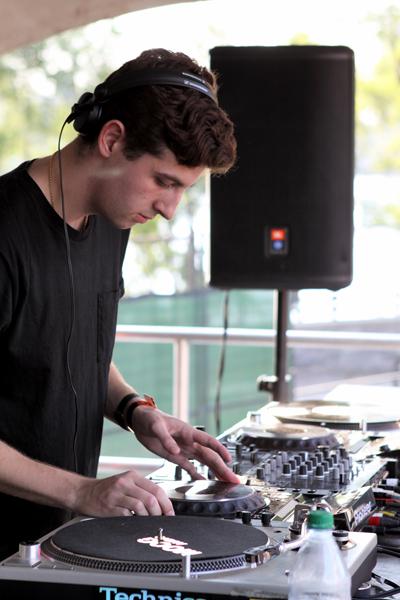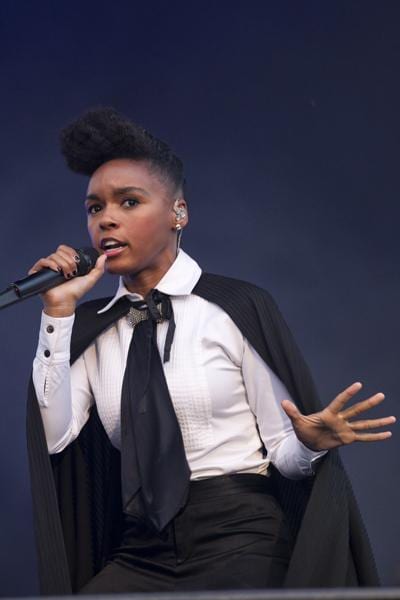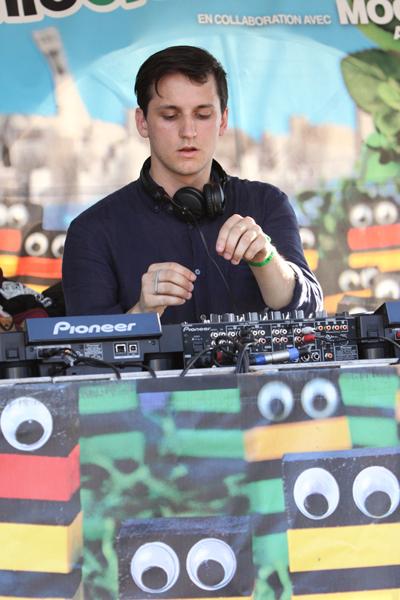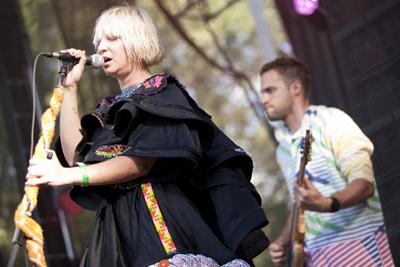
DJ and producer Jamie xx. Credit: Nick Leger

R&B soul sensation Janelle Monáe. Credit: Pat Beaudry

Montreal DJ Jacques Greene. Credit: Nick Leger
Montreal’s City of Festivals designation sure seems justified come summertime. A whirlwind of alluring options leaves local culture buffs frantically reworking their schedules. Last weekend provided a veritable clusterfuck of options for local queers: the final weekend of Divers/Cité, the city’s annual gay arts and music festival; the last weekend of Just for Laughs, which showcased talented queer comics like DeAnne Smith; the next-to-last weekend of the Fantasia Film Festival, which offers plenty in the way of gore, camp and assorted cinematic excess; and the four-day MEG, or Montreal Electronic Groove.
But none seemed to generate as much enthusiasm (and press coverage) among Montrealers as the sixth edition of the Osheaga Music and Arts Festival, which went off without a hitch – a perfect summer scorcher with 450 accredited journalists to boot – from July 29 to 31 at Parc Jean-Drapeau. Osheaga caters to the same youthful clientele as its West Coast cousin Coachella, drawing in a substantial number of queer attendees who are fond of indie acts like Owen Pallett, Diamond Rings, Tegan and Sara, Sigur Rós and Xiu Xiu. Whether a conscious programming decision or not, Osheaga has been steadily building its queer fan base over the last six years, as it has welcomed openly gay musicians such as Pallett, Vampire Weekend’s Rostam Batmanglij, Rufus Wainwright, Bloc Party’s Kele Okereke and queer-adulated performers like Robyn, MIA, La Roux and Tiga.
With previous headliners including Coldplay, Arcade Fire, Weezer and The Smashing Pumpkins, Osheaga could already, arguably, claim to be Canada’s biggest indie music festival. But the 2011 edition shattered its previous attendance record of 53,000 with a whopping 81,000 spread out over three days. More than half that audience came for Detroit rapper Eminem’s Friday night performance, for which Osheaga organizers reportedly shelled out upwards of $2 million.
Rock fans get down
And while Eminem isn’t exactly what you’d consider a gay ol’ time (unless you’re referring to the alpha-male crotch-grabbing homoeroticism), the remainder of the 100 or so acts provided ample celebratory moments for revellers of all stripes. Osheaga’s Piknic Électronik stage proved to organizers that quality DJ sets are also of great appeal to a primarily indie rock crowd. Mega-prolific British DJ/producer Jamie xx, the third, more self-effacing, member of indie-pop act The XX, drew the biggest audience of any artist on that stage with his spirited Sunday evening set of lush melodies and sensitive bass music. Hometown house hero Jacques Greene, who’s gotten heaps of great press abroad for his The Look EP, fed dancers a full serving of sumptuous basslines, deep grooves, reinvented R&B and all-around rhythmic sophistication.
Among the high points of this edition were sprightly R&B soul sensation Janelle Monáe, who funkified the main stage with her vocal prowess and commanding presence; Brooklyn duo Ratatat, whose totally infectious, instrument-driven electrorock was a clear crowd favourite; and Toronto indie supergroup Broken Social Scene, who gave one of their best performances in recent memory, calling on local Stars frontwoman Amy Millan to join them onstage.
Queer bite
On the queer front, angel-voiced Aussie Sia performed a medley of both upbeat ditties and heart-wrenching numbers (“Breathe Me,” as any Six Feet Under fan will attest), sending chills through the crowd gathered under a blistering sun. With her bandmates sporting colourful, striped onesies, Sia commanded the hour with her powerful pipes, while also firing back to a rowdy bloke who requested she flash her breasts, quipping that “they’re just like your mom’s.” Now that’s what I call pop with bite.
California musician Will Wiesenfeld, of Baths, a one-man glitch-pop vehicle clad in skimpy gym shorts and a grey tank, also found a captive audience on Sunday night, even though he had the unenviable task of performing against the day’s headlining acts, The Flaming Lips and Death Cab for Cutie. Onstage with his Mac and mixing board, he provided lively retoolings of tracks from his album Cerulean. Lots of arm flailing ensued on his part, lots of rump shaking on ours.
Room for more than one late-July music fest
It’s clear that Divers/Cité continues to be an invaluable event, offering a much-needed reminder that the local queer community has come a long way since D/C’s very modest beginnings in 1993, following the now-infamous 1990 Sex Garage police raid. D/C, along with Bad Boy Club Montreal (organizers of the annual Black & Blue), have been instrumental in attracting highly sought after pink dollars to the city over the past two decades, while in the process branding it as an international gay mecca of sorts. But they’re no longer the sole summer fest catering to queer audiences. And there’s nothing wrong with that.
What’s most interesting is that while both primarily music-oriented events take place during the same period, there seems to be little in the way of audience overlap. At D/C, the music carries a much greater social connotation, with a predilection for uplifting diva ditties about emancipation. There’s also a smattering of thumping rhythms to celebrate such freedoms out in the open, such as DJ Frigid and Deee-Lite’s Lady Miss Kier, who performed at this year’s Le Grand Bal.
At Osheaga, music connoisseurs cough up substantial coin to hear the most cutting-edge and relevant indie music around. Festival ticketgoers are eager to discover up-and-coming acts and be taken out of their musical comfort zone by folks who know what they’re doing.
Come late July each year, Montreal queers are faced with a tough decision: D/C’s empowering final weekend, with its vast array of free shows, or Osheaga’s fine-picked, though pricier, bill of musicians? And what about those who want a piece of both? Well, the D/C parties run well into the night, so there’s always a way to tick two remarkably well-run local fests off your cultural checklist. Just make sure not to forget the sunscreen and necessary hydration.

 Why you can trust Xtra
Why you can trust Xtra


